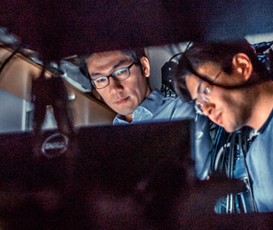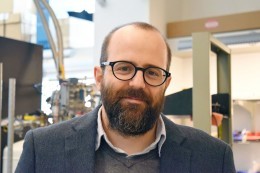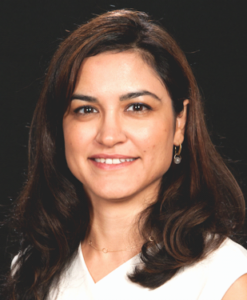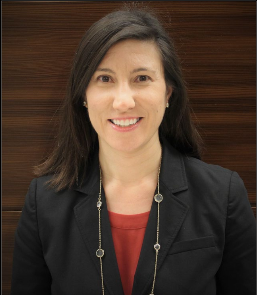Established in 1996 by the National Science and Technology Council (NSTC), PECASE was created to recognize and honor early career researchers in the United States. These outstanding scientists and engineers have already contributed significantly to the nation’s body of scientific knowledge and show great promise in their future careers.
The goal of the BRAIN Initiative is to deepen understanding of the inner workings of the human mind and to improve how we treat, prevent, and cure disorders of the brain. The Initiative is helping to develop new – and improve existing – tools and techniques to study the brain. Those in the scientific administration of the BRAIN Initiative have dedicated their efforts to creating a supportive environment and network that fosters neuroscientific innovation, while those who have received BRAIN Initiative grants are actively working to develop novel technologies for understanding and treating neurological conditions.
On July 2nd, nine BRAIN-funded scientists and three scientific program directors were included among the recipients of the 2019 PECASE awards:
- Kwanghun Chung, Massachusetts Institute of Technology
- Cory Dean, Columbia University
- Adriana Galván, University of California – Los Angeles
- Aysegul Gunduz, University of Florida
- Alexis Jeannotte, Intelligence Advanced Research Projects Activity
- Daniel Llano, University of Illinois – Urbana-Champaign
- Piya Pal, University of California – San Diego
- Christina Payne, University of Kentucky Research Foundation
- David Markowitz, Intelligence Advanced Research Projects Activity
- Spencer Smith, University of North Carolina – Chapel Hill
- Joel Voss, Northwestern University
- Chuan Xue, Ohio State University

Kwanghun Chung, PhD
Dr. Kwanghun Chung is an Associate Professor of Chemical Engineering at Massachusetts Institute of Technology (MIT). There, he is a faculty member of the Institute for Medical Engineering and Science (IMES) and Picower Institute for Learning and Memory. He has received a BRAIN grant through the National Institutes of Health (NIH).
Chung’s research team is developing novel technologies to analyze large-scale, complex biological systems. One such method they use is CLARITY, a method for internally visualizing human and animal brains using intact specimens. They hope to create what will be the most comprehensive three-dimensional map of the human brain with ultra-high resolution, incorporating information on cellular networks, phenotypes, and gene expression.

Cory Dean, PhD
Dr. Cory Dean is a Professor of Condensed Matter Physics at Columbia University. He has received a BRAIN grant through the National Science Foundation (NSF).
Dean’s research focuses on the application of solid-state systems for the investigation of microscopic structures. They are examining the ways electrons travel and interact with each other in single-atom-thick sheets of materials like graphene and insulating boron nitride. Ultimately, this technology could be used to develop nano-scale electronic devices to analyze and manipulate brain cells with a high degree of accuracy while using low amounts of energy.

Adriana Galván, PhD
Dr. Adriana Galván is a Professor of Psychology at the University of California in Los Angeles (UCLA). There, she is the Director of the university’s Developmental Neuroscience Laboratory. She has received a BRAIN grant through the NSF.
Galván is working to identify the underlying neural mechanisms that drive behaviors in teenagers.
“Adolescence is characterized by brain development and experiences that help influence long-term well-being and outcomes by giving young people the opportunity to develop confidence, agency, and social engagement,” says Galván.

Aysegul Gunduz, PhD
Dr. Aysegul Gunduz is an Associate Professor at the J. Crayton Pruitt Family Department of Biomedical Engineering at the University of Florida. There, she is the director of the university’s Brain Mapping Laboratory. She has received a BRAIN grant through the NIH and serves as an IEEE Brain volunteer (theme chair to IEEE NeuroCAS 2018 and IEEE Brain/The Kavli Foundation 2018 “Think Tank”).
Gunduz is working to better understand how neurons interface with each other, send signals, and adapt to new situations, hoping to find clues on the causes of neurological disorders such as essential tremor.
“I have been nominated for the PECASE by the National Science Foundation for my laboratory’s efforts to develop closed-loop deep brain stimulation systems that can adapt their stimulation parameters based on a patient’s brain activity,” says Gunduz. “It is a great honor to receive this award as an engineer-scientist and an immigrant.”

Alexis Jeannotte, PhD
Dr. Alexis Jeannotte is a Program Manager at the Intelligence Advanced Research Projects Activity (IARPA) for neuroscience and related disciplines. There, she oversees the organization’s Strengthening Human Adaptive Reasoning and Problem-Solving (SHARP) and Multimodal Objective Sensing to Assess Individuals with Context (MOSAIC) programs. She is also one of the organization’s program managers for BRAIN funding opportunities.
Jeannotte’s research interests focus on human behavior. Specifically, the SHARP and MOSAIC programs investigate adaptive reasoning, problem solving, and decision making in the workplace. Information on these processes is being used to create methods to predict performance and productivity of employees over time under specific circumstances, enabling employers to make informed decisions for company policies and human resources.

Daniel Llano, MD, PhD
Dr. Daniel Llano is an Associate Professor in Molecular and Integrative Physiology at the Beckman Institute at the University of Illinois. He has received a BRAIN grant through the NSF.
Llano’s research group is working to understand how the brain processes complex sounds, such as speech.
“We are particularly interested in how the auditory system uses high-level information to help navigate cluttered or noisy environments,” Llano explains. “The long-term goal of this work is to understand and help treat disorders of sensory processing, such as dyslexia, autism and aging-associated hearing loss.”

Piya Pal, PhD
Dr. Piya Pal is an Assistant Professor in the Department of Electrical and Computer Engineering at the University of California in San Diego (UCSD). She has received a BRAIN grant through the NSF.
Pal is developing novel methods to efficiently analyze large sets of complex data, such as from neurological signal processing and molecular-level imaging. She is combining technologies for single-cell resolution imaging and for data collection over longer periods of time. This will be invaluable for understanding the ways neurons behave at individual and population levels in neurological disorders such as epilepsy, depression, or memory problems.

Christina Payne, PhD
Dr. Christina Payne is the Director of the NSF’s Division of Chemical, Bioengineering, Environmental, and Transport Systems (CBET). She is also one of the foundation’s program managers for BRAIN funding opportunities.
Payne’s research group uses molecular models to study the relationship between the structure and function of enzymes. They also promote the advancement of neurological knowledge and research by conducting outreach to students and the broader public through teaching, communicating with journals and other forms of press, and providing educational materials.

David Markowitz, PhD
Dr. David A. Markowitz is a Program Manager at IARPA, where he runs high-risk, high-payoff research and development programs at the interface between biology, engineering, and computer science. This includes “Machine Intelligence from Cortical Networks” (MICrONS), a BRAIN Initiative program that seeks to develop more capable machine learning algorithms by using neuroscience as a guide; and the “Molecular Information Storage” (MIST) program, which is developing polymer-based data storage and retrieval devices that substantially reduce the resource requirements of exabyte-scale data centers.
Markowitz’s PECASE nomination cited “innovative research at the intersection of neuroscience, machine learning, and high-performance computing [which] has laid the foundation for powerful new computing capabilities”. Through his ongoing work at IARPA, and as a member of the NIH BRAIN Initiative Working Group 2.0, Markowitz says he is focused on pursuing new opportunities for neuroscience to drive progress in the fields of computing and biomedicine.

Spencer Smith, PhD
Dr. Spencer Smith is an Associate Professor of Electrical and Computer Engineering at the University of California in Santa Barbara (UCSB) and is a Co-Director of the university’s own Brain Initiative program. He has received two BRAIN grants through the NSF (NeuroNex Technology Hub and BRAIN EAGER awards) and was part of an IARPA MICrONS team.
Smith’s research group studies the ways individual and populations of neurons function when performing complex activities, such as processing visual data. To do so, they have been developing new microscopy methods which use multiphoton imaging to record synaptic firing.
“My lab is part engineering and part neuroscience,” Smith says. “This award recognizes the work people in my lab have done to develop new imaging tools for neuroscience and applying them to gain insights into how neural circuitry works. We will use the award to continue our technology development, help our fellow scientists, and explore the frontiers of neural circuitry.”

Joel Voss, PhD
Dr. Joel Voss is an Associate Professor of Medical Social Sciences, Neurology, and Psychiatry and Behavioral Sciences at Northwestern University in Chicago. He has received a BRAIN grant through the NIH.
Voss’s research group studies the function of neuronal networks and how these are disrupted in neurological disorders.
“I use noninvasive stimulation to study the brain network of the human hippocampus, with the goal of developing new treatments for memory disorders that result from hippocampal damage or dysfunction,” says Voss.

Chuan Xue, PhD
Dr. Chuan Xue is an Associate Professor of Mathematics at Ohio State University and is the Associate Director of the university’s Mathematical Biosciences Institute. She has received a BRAIN grant through the NSF.
Xue and her research group develop mathematical models for cellular organization and communication during development.
“Broadly speaking, I am interested in understanding how neurons develop their highly polarized shape and how they interact with other cells using mathematical models in collaboration with experimentalists,” Xue says. “My recent research is centered on explaining how focal axonal and/or dendritic swellings, i.e., intracellular traffic jams, occur in many neurodegenerative diseases including ALS, Multiple Sclerosis and Charcot-Marie-Tooth as well as traumatic brain injury. We develop multiscale computational models to explain experimental data and make testable predictions.”
These remarkable 2019 PECASE recipients are providing ground-breaking tools, technologies, and services for the neuroscience community. We congratulate them and look forward to their future contributions – and all of those involved in the BRAIN Initiative – which ultimately aim to advance the understanding of healthy and diseased brain circuit function through technological innovation.

